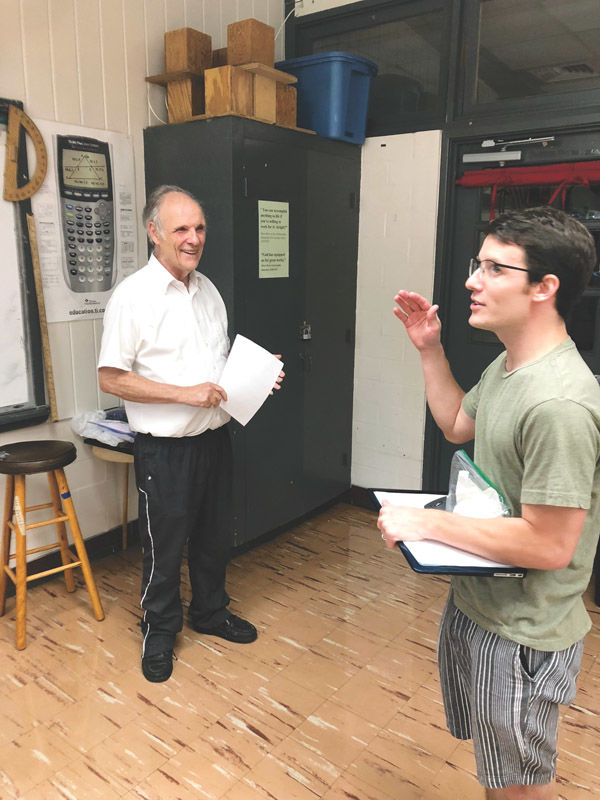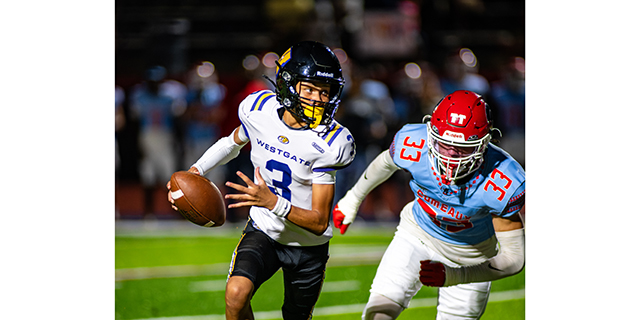Students become the teachers in Lessons in Learning
Published 1:40 pm Sunday, August 4, 2019

- Doc Voorhies with is student, now colleague at Catholic High School, share a light moment remembering some of the antics that helped students learn throughout the years.
For more than 40 years, Donald Voorhies Ph.D. has been doing what he said he was born to do — teach. As the school year begins, a reminder of some of the important things about teaching and learning from four former students of the professor. More than 100 students from the more than 2,000 that have passed through his classes at Catholic High School are teachers.
Four former students, now teachers and administration at CHS, recently shared the insight they gleaned in his classroom and now impart to others. Voorhies students are part of an “unspoken club” that may not be exclusive, but sure is unique. The Doc Alumni have watched, listened and learned a few things from the master teacher that all of us could put into practice on daily basis — especially making the most of every moment of every day. Here are some thoughts about the man that inspired them to become teachers. Pictured above from left, Bo Belanger, history teacher, Taylor Ducote, math teacher, Stella Arabie-Delcambre, principal, and Erin Breaux Henry, administrator of student affairs and communications.
What is Dr. Voorhies like as a teacher? Is he tough?
ALL — Yes.
EH class of 1992 — He’s a demanding teacher and sets the bar high. He expects his students to get there, but he’s going to help them.
TD class of 2008 — This is my 6th year teaching high school, I’ve heard other teachers talking about students struggling and how maybe the standards should be lowered to help them. Then I think, that’s not what Doc did. He kept the bar high and provided the step stool to get there. He’d never lower the bar. We’re going to keep the bar high and help until you don’t need the help anymore. I do that because that’s how I observed Doc’s teaching. He never expected less of a student, he expected the student to work hard.
SD class of 1995 — He offers after hours tutoring if a student needs it. It’s so ingrained in everything he does, it’s as if you’re watching a craft, an artist painting a painting. As teachers we know how hard it is to do this, and he does it in such an innate way it seems effortless to those observing.
When did you first get to know Doc?
SD — I first got to know him as a 7th grade student, he wasn’t my teacher but we were helping at math tournaments and academic competitions. I had the potential to be advanced and although almost every student probably feels this way, at that age, I thought, “Doc took an interest in me.” He took the time to come talk to me, got me out of class and made me feel so special. I may have had a talent in math, but over the years, he’s worked with my children. Seeing him as a parent, a collegue, now his supervisor, he does it with every student. He builds the steps. My interactions with Doc over my whole life, in addition to my family, is as a person and in the classroom. He has been the one to always build the steps. That’s what I’ve taken from him, I call it paying it forward, that in our interactions, they will be better for it. And he does that with everyone.
TD —I was a freshman and my brother was a junior and we both won a trip to the international science fair to Phoenix, AZ and he was the chaperone for the trip. We went on to New York City to be on CNN straight from the fair. My parents kept their anniversary plans and Doc chaperoned us to CNN — and gave us a tour of NYC. He made sure we had a good time and took us everywhere. He wants to make sure everyone around him, in the classroom or now, has the best experience.
BB Class of 1980 —I’m pretty certain I was in Dr. Voorhies first class here. We couldn’t give him a hard time. He has shared with me, as a friend as well as colleague, that when he came to Catholic High, he wanted it to be a long term position. So he had to establish himself when he first got here. I do not remember this but it would have happened in my class, our DA Bo Duhé broke the class rule. When a test was given out, there was no talking. Someone sneezed and Bo turned to say, God bless you. Dr. Voorhies picked up his paper and said, “No talking.” We didn’t know what hit us. Definitely a man that provided the stepping stones to help us and we could see that. He was tough, he knew his subject (Algebra I). He challenged us.
He talks about a retired school teacher at that time that took him under her wing, Gladys Viator, we still have an award in her name. She was like the English Dr. Voorhies and he would meet with her daily. (BB) Every day she asked him, what did you do for your top student and what did you do for your most struggling student.
Many of my classmates rose to the challenge but math was not my thing, I teach history. I came out with a great appreciation for a good man. I got here teaching in 2007 after 25 years teaching in Baton Rouge. I was struggling that first year after Christmas break. I needed to get involved in the community and he was directing “A Little Shop of Horrors.” He asked me to stage manage and that’s how I got started with Iberia Performing Arts League. Through Catholic High or the community, he has touched generation after generation. We all hold that in common. There is always the question,“Did you have Doc?”
What do others say about Doc Voorhies?
BB — I left briefly to be administrator at Grand Coteau. One of our math teachers was talking about prep for rally, and he looked at me and said, “Yeah, but y’all had Doc.” The reputation is out there. He put Catholic High academically on the map.
What does it mean to honor his legacy as former students now educators?
SD — When the school was smaller and all boys, every student probably took from him. My connection back to him as an adult came as a phone call from Doc. I was teaching at ULL and Doc called and asked if I would consider coming back to CHS. I’d never say no to Doc. That’s where it all began. Part of his legacy is the generation of educators. At one time our entire math department were former students he had taught.
EH —Down to elementary.
SD — Even today he checks in on me to make sure I am OK. I want to do a good job, because I want to make him proud.
TD — My classroom is largely structured around what I got from him. My high school math education, from 8th grade, was three years of Doc and two years of Stella Arabie-Delcambre. So basically, five years of Doc. My math classroom, my vision, is mostly, “What would Doc do in this situation?” I didn’t go into education but rather math, largely because of him. Partly it is the attitude in the classroom. Even in high school I made mental notes about what was effective ways of teaching and which weren’t. He was the standard, not just for math, but how he handles behavioral issues, talks to students, listens and respects them.
EH — Even when you’re being corrected by him, there was respect. There was never any anger —consequences and move on. I knew in college I wanted to be in administration. Doc is the reason I went into education.
SD — I didn’t know what I wanted to do, and from Doc’s recommendation because I was good in math, I got a degree in math. I was shocked when I got to college and the teachers didn’t teach like Doc.
BB — As a teacher, but also I can’t think of an extracurricular event, that he was not present at the same time. Rules in class, but always at every event enjoying himself.
Summarize the characteristics of Voorhies Teaching 101?
ALL — Humble.
SD — His sense of humor. It is the underlining humor, talking about math like explaining what a Polynomial is, that’s a math term (Poly-no-meal).
EH — The formal relationship is still there. When I came to be a teacher for the first time, he still greeted me as Ms. Breaux and remembered my accomplishments years ago. Also working with him as a colleague impresses me. Three years into it I wrote this big grant for science and was awarded the grant. The next day there was a gift note from him congratulating me. He was always very attentive, checking on me and knew what was going on across campus.
BB — How he addresses us in class. I’m one of the few people that still call him Dr. Voorhies. He’ll teach anything that administration wants, but if you ask him what he wants to teach, most teachers will say the advanced classes. Doc likes Algebra I because he wants to make sure he teaches a strong foundation to build upon. That speaks volumes. Concentration on understanding is always a part of what Doc does in the classroom. But also in life.
Doc, you get the last word about teaching?
St. Ignatius of Loyola had a big saying, “To work is to pray, as long as it is for the glory of God.” So I told them we are not just going to say a prayer for the class to start, we’re going to pray for the whole class because we’re going to work for the whole class. That’s one of my little mottos. One of my proudest moments as a teacher is when I have to go to a former student — who is now a teacher — to ask about something. It’s an amazing feeling.





